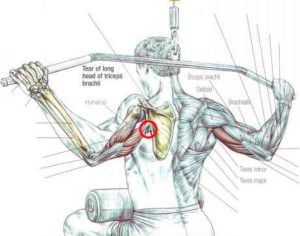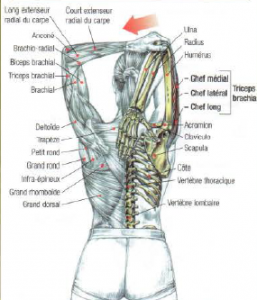I read Frederic Delavier’s book « Strength Training Anatomy » and I learned good stuff.
Podcast:
Back exercises with very heavy weights can create injuries to the long head of the triceps. In fact, the latissimus dorsi is a powerful muscle and its function is to bring your arms close to your rib cage. It’s because your distal tendon anchored in your humerus.
It’s for this reason that it’s called the climber’s muscle. Your long head of triceps has the functions of extending your forearm to bring your arm nearer to your rib cage. It’s when you bring your arm closer to your rib cage that your long head of triceps and your latissimus dorsi work.
Usually, it’s when the long head of the triceps has not had a good warm-up or exhausted of having a tear. For example, imagine you do lat pulldowns. In the phase of the movement where you don’t use your latissimus dorsi, all the tension is on the long head of triceps. In a few thousandths of a second, it can tear your triceps long head. Usually, it’s located near the connection of your triceps long head and the scapula. Luckily, it’s rare to have a total tendinous tear.
This type of injury doesn’t have the same consequence as shoulder injuries. A shoulder injury almost forces you to stop training the upper body.
Despite the injury, it’s possible to do exercise with light weights. You can do exercises like low cable row, T-bar row and triceps pushdowns with the elbows along the body.
It’s recommended to have a rest period before to restart the upper body training.
Note
It’s possible a triceps long head tear with the barbell lying extension. To avoid this, it’s advisable to do some stretching exercises before training.
Share this article if you think it can help someone you know. Thank you.
-Steph


Rock climber here, tore mine a few weeks ago in the exact spot highlighted. Too difficult of a warm up climb because the gym set a bunch of competition routes that were crazy hard, leaving almost nothing to warm up on. Got some bruising, a bit of swelling, pain for 1-2 days. So far rehab has been going good. I took a week off, then started exercising with super light weights and I am slowly building up. Tricep extensions now feel fine at 50% normal weight, push up, zero pain with no added weight ( previous 50 lbs added ). Rows feel fine at 50% weight. Bodyweight pull-ups still feel like a no-go at this point ( used to add 55lbs ). I feel like another 2 weeks I can start very light climbing. I feel like once I can do 5 pullups with zero pain I can start harder route climbing and easier bouldering ( probably just 4x4s on jugs at first ). Once I am back to adding 25lbs on pullups I figure I can start going all out. I feel like thats probably 2-3 months out. Unfortunately I have a couple climbing trips I am committed to taking my daughter on, so I will just be a belayer/guide for them. I prefer climbing in the cold anyhow and that season is almost over.
Hey there,
Thanks for reaching out and sharing your experience! It’s awesome to hear that you’re making progress in rehabbing your triceps tear and gradually returning to climbing.
As you’ve mentioned, taking a smart and cautious approach to recovery is crucial. It’s important to give your body the time it needs to heal, so starting with super light weights and gradually increasing the load is definitely a wise strategy to follow.
Listening to your body is key, and it’s essential to avoid any exercises or movements that cause pain or discomfort. Additionally, incorporating exercises that target the surrounding muscles, like the rotator cuff and scapular stabilizers, can help support your recovery and prevent future injury.
Keep in mind that every injury and recovery plan is unique, so seeking personalized advice from a medical professional or physical therapist can be beneficial in developing the best plan for your specific situation.
We wish you all the best in your recovery journey and your future climbing endeavors!